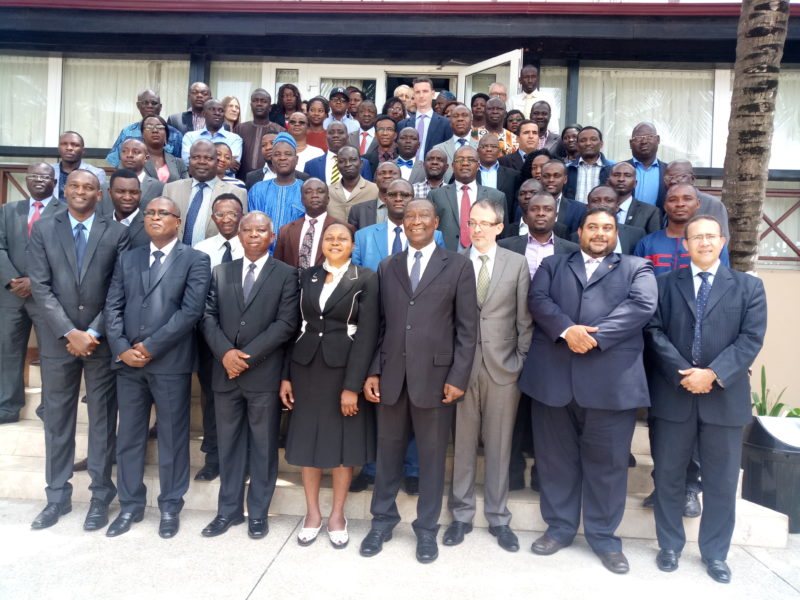Stakeholders from across the globe have commended Africa’s trail-blazing web-based monitoring and reporting system for the water and sanitation sector.

The laudatory remarks were made in Accra, Ghana on Wednesday, May 3, 2017 at the opening of a week-long review workshop on the harmonised, region-wide monitoring and reporting framework for Water and Sanitation sector in Africa. The workshop draws participants from over 42 African countries as well as stakeholders from the global water family including the UN Water, WSSCC, UNICEF, UNESCO, UNECE and WHO GLAAS. Also in attendance are representatives of the African Union Commission (AUC) and the African Water Facility (AWF).
Developed in 2016 by the African Ministers’ Council on Water (AMCOW), the Pan African Monitoring and Reporting System serves as a platform to report progress on the implementation of the AU Heads of States and Governments’ Sharm el Sheikh Commitments which seek to accelerate the achievement of the Africa Water Vision 2025, as well as the global high level political commitments on the Sustainable Development Goals (SDGs) on water and sanitation.
Considered as one of the most ambitious attempts at tracking sectoral progress, the system, according to Dr. Canisius Kanangire, AMCOW’s Executive Secretary, represents Africa’s readiness to learn from past mistakes in monitoring the implementation of the MDGs as well as efforts being made to attain Africa’s Agenda 2063.
The Ghanaian Sanitation and Water Minister, Joseph Koffi Adda, while declaring open the workshop, expressed his delight at AMCOW’s decision to convene the first review process for the Pan African Water and Sanitation Sector Monitoring and Reporting System in Ghana which is the home of Pan-Africanism. Represented by the Ministry’s Chief Director, Joseph Obeng-Poku, the minister recalled the words of the late Pan Africanist leader, Kwame Nkrumah, who on the 24th of December 1957 described access to water as a barometer for measuring the progress and welfare of the people.
“I therefore see the decision by African Political leaders to set up a Pan-Africa Harmonised Monitoring and Reporting System for the water and sanitation sector in order to report regularly to the Assembly of Heads of State and Government under the Africa Union as a desire to fulfil the vision and dreams of founding fathers of the continent,” Adda said.
Sylvester Matemu, AMCOW’s Technical Advisory Committee Chair, in his remarks lauded the workshop idea as a credible way of “reviewing the AMCOW monitoring system and deepening partnership with relevant global agencies for effective and harmonised monitoring and reporting processes.” According to Matemu, the workshop which also serves as the first inaugural meeting of the Integrated Monitoring Initiative under the UN Water Family “provides an opportunity to launch the 2017 data collection and submission campaign.”
Representative of UN Water, William Reidhead, in his remarks stated: “UN-Water is very pleased to have a chance to join efforts with AMCOW in this work. During the week to come we look forward to learning about the established mechanisms for national and regional monitoring in Africa, and steps that can be taken to harmonise the regional and global efforts.
“We are excited to explore opportunities for collaborating with AMCOW and with participating countries in the 2017 baseline process; and we are additionally interested in learning about communities of practice in Africa which can serve as an example for other regions in the world.”
Olushola Olayide of the AU Department of Rural Economy and Agriculture while delivering the statement of the African Union at the workshop expressed delight over the fact that “the Monitoring and Reporting System for the Water and Sanitation Sector in Africa allows AMCOW, through the Specialised Technical Committee on Agriculture, Rural Development, Water and Environment of the AUC to report periodically on the progress of Water and Sanitation in Africa vis-à-vis progress made towards achieving the Africa Water Vision 2025; the Sustainable Development Goals 2030 (SDGs); the Sendai Framework for Disaster Risk Reduction (DRR); and our Africa Agenda 2063.”
The African Union Commission in its statement urged UN Agencies and Partners to ensure that monitoring and reporting processes at Global level are aligned and linked with the Pan Africa Water and Sanitation sector Monitoring and Reporting System by working closely with the AMCOW Secretariat. This, according to Olayide, is to “avoid unnecessary duplication and placing an unwarranted additional monitoring burden on Member States.”
Francis Konu, representative the African Water Facility (AWF), hailed the continental monitoring and reporting platform established by AMCOW as timely and highly appropriate as “it is in sync with the African Development Bank’s drive to Light up and power Africa, Feed Africa, Integrate Africa, Industrialise Africa, and Improve the quality of life for the people of Africa.”
The web-based Reporting system was developed with funding from the African Water Facility (AWF), and supported by the M&E Task Force, the German Cooperation as well as the Bill and Melinda Gates Foundation (BMGF) and with technical assistance from UNEP-DHI. The highlight of the portal which can be accessed at http://www.africawat-sanreports.org is the 2016 Status Report of 42 African member states submitted using an online reporting framework. It also contains the 2013 and 2014 data submitted by Member States using a temporary paper based template.
The system which serves as database on water and sanitation for Member States in Africa is expected to promote cross-sector learning and knowledge dissemination within the water, sanitation, food, energy and climate nexus while supporting joint sector reviews. The online portal comes with maps and tabular view options which makes it easy to compare progress on various indicators across Member States in Africa.
Courtesy: PAMACC News Agency
